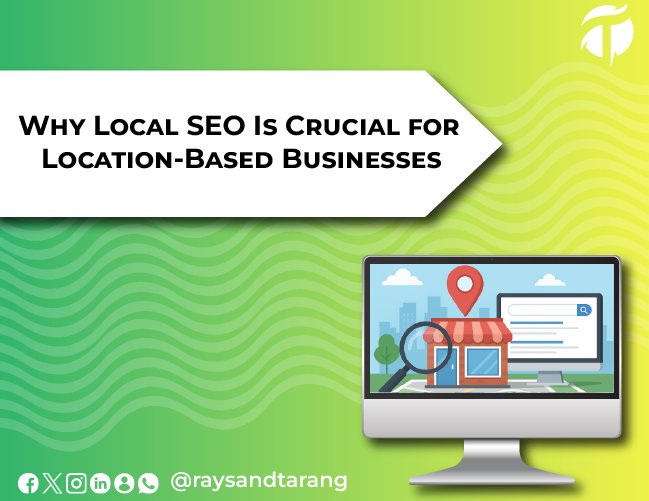Local SEO Puts You on the Digital Map
What It Means
Local SEO involves optimizing your website and Google Business Profile so that your business appears in the “Local Pack”—a highlighted area in Google’s search results that features top businesses relevant to a local query, alongside a map. This includes managing your contact info, location tags, opening hours, and customer reviews.
Why It Matters
Appearing in the Local Pack dramatically improves your visibility. Imagine a user searching “website developers Chandigarh” and seeing your business featured at the top—complete with directions, a contact button, and reviews. This convenience often leads to quick actions like phone calls, store visits, or online inquiries—making it a powerful tool for driving real-world traffic and conversions.
Targets Customers Searching Nearby
What It Means
Local SEO allows you to appear in searches made by people physically close to your business. These include “near me” searches or city-specific queries such as “best salon in Kashipur” or “digital marketing agency Dehradun.”
Why It Matters
Users who search locally usually have high intent—they’re ready to visit or make a purchase. If your business shows up in that critical moment, you capture their interest before competitors do. This leads to faster conversions and a better return on investment for your marketing.
Increases Trust with Verified Business Listings
What It Means
Local SEO includes setting up and verifying your Google Business Profile, making sure your NAP (Name, Address, Phone) details are consistent across all platforms. It also involves uploading images, service descriptions, FAQs, and managing public reviews.
Why It Matters
People trust businesses that Google verifies and displays prominently. An optimized listing builds credibility and reassures customers they’re dealing with a professional and accessible business. Inconsistent or missing information, on the other hand, can reduce trust and cause potential leads to choose your competitors.
Enhances Mobile Visibility for On-the-Go Searches
What It Means
Local SEO ensures your business appears on mobile-friendly platforms like Google Maps and local directories. It focuses on delivering fast-loading, location-based, responsive content that performs well on smartphones and tablets.
Why It Matters
Most local searches happen on mobile devices when people are actively seeking immediate solutions. Appearing at the top during these mobile searches means you reach customers at the moment they’re ready to take action, whether it’s calling, visiting, or buying.
Boosts Foot Traffic to Physical Locations
What It Means
By integrating your location with Google Maps, Waze, and other navigation tools, Local SEO guides potential customers straight to your store, showroom, or office. Your listings will show opening hours, directions, and reviews.
Why It Matters
If someone nearby is looking for a “grocery shop open now” or “laptop repair center near me,” your business can appear with a clickable map route. This can lead directly to more walk-ins, especially if your competitors haven’t optimized their listings as thoroughly.
Targets the Right Audience with Geo-Specific Keywords
What It Means
Geo-targeted keywords are phrases that combine your service with your location, like “web designing company Uttarakhand” or “digital marketing agency in Haldwani.” These terms help you attract people looking for services where you are.
Why It Matters
Instead of competing globally for general terms, you rank for local searches where competition is lower but relevance is higher. This drives more qualified leads who are far more likely to convert because they’re actively searching for a service you provide in their area.
Encourages Customer Reviews and Social Proof
What It Means
A critical part of Local SEO is encouraging happy customers to leave public reviews. These reviews appear on your Google profile, third-party listings, and even on your website.
Why It Matters
Social proof is powerful. When prospective clients see that others have had a positive experience with your business, they are more likely to trust and engage with you. Reviews also influence your search rankings—the more good reviews you have, the higher you show up in local results.
Provides Insights Through Google Business Analytics
What It Means
Google Business Profile offers analytics showing how users find your listing—what keywords they used, whether they called, requested directions, or visited your website.
Why It Matters
These insights give you the power to make data-driven decisions. For instance, if most users are calling during lunch hours, you could adjust your team’s availability. If people are searching for services you haven’t highlighted, you can update your profile or website accordingly.
Helps You Compete with Larger Brands Locally
What It Means
While multinational companies may dominate general search rankings, Local SEO allows smaller, local businesses to outrank them for local search terms.
Why It Matters
Local SEO levels the playing field. When a customer types “website development agency near me,” they’re shown businesses based on relevance and proximity—not brand popularity. This means your business can appear before global companies, giving you a fair chance to win that customer.
Delivers Long-Term Visibility at Lower Cost
What It Means
Local SEO does not rely on ongoing ad spend. Once your business is properly optimized and continues to earn reviews and engagement, it maintains visibility through organic results.
Why It Matters
It’s a cost-effective strategy with high long-term value. While ads provide short bursts of visibility, Local SEO delivers sustained exposure, ensuring that your business continues to receive leads and inquiries with little ongoing expense.
Final Thoughts
Local SEO is no longer a nice-to-have. For regionally focused businesses, it is the backbone of discoverability and growth. It not only helps your ideal customers find you—it makes them trust and choose you over others. Whether you’re a shop owner, service provider, or IT company, ignoring local SEO means missing out on traffic, leads, and sales.

